It’s no secret that Cyprus is a leading place for destination weddings among Middle Eastern couples – a trend that has only strengthened its popularity in recent years. For example, in 2013 alone 581 Lebanese weddings were recorded on the Island of Love. In this article, we offer some insights into what makes Cyprus such a popular spot for marriage among Lebanese couples based on our extensive knowledge and expertise.
The Location
Cyprus is famous for many things – its warm climate, hospitable people and picturesque landscapes with crystalline waters, beautiful beaches and quaint little villages to name a few. But what makes Cyprus a perfect place for Lebanese couples wishing to register their union? One of the most attractive features of this island is its proximity to Lebanon – it takes only 40 minutes to arrive from Beirut by plane, and no additional bureaucratic formalities, especially if you have a Shengen visa on hand.
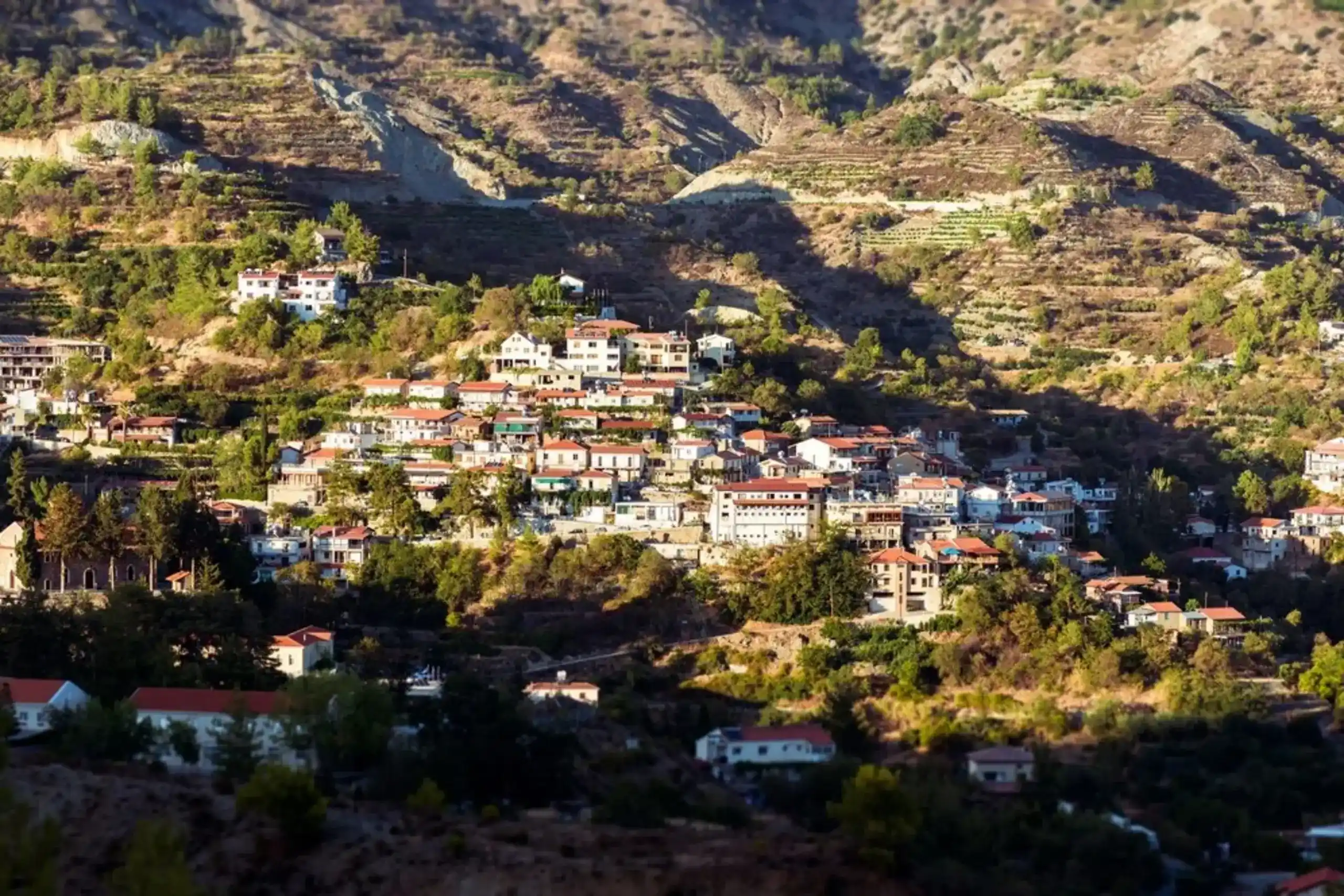
Marriage Registration
Known as the Island of Love, Cyprus has been attracting Lebanese couples, in large part, due to the ease of marriage registration, minimal bureaucracy and a variety of breathtaking locations for a church ceremony – there are plenty of opportunities to celebrate a civil mariage, a Maronite church ceremony or Katb-al-kitab full of style and romance.
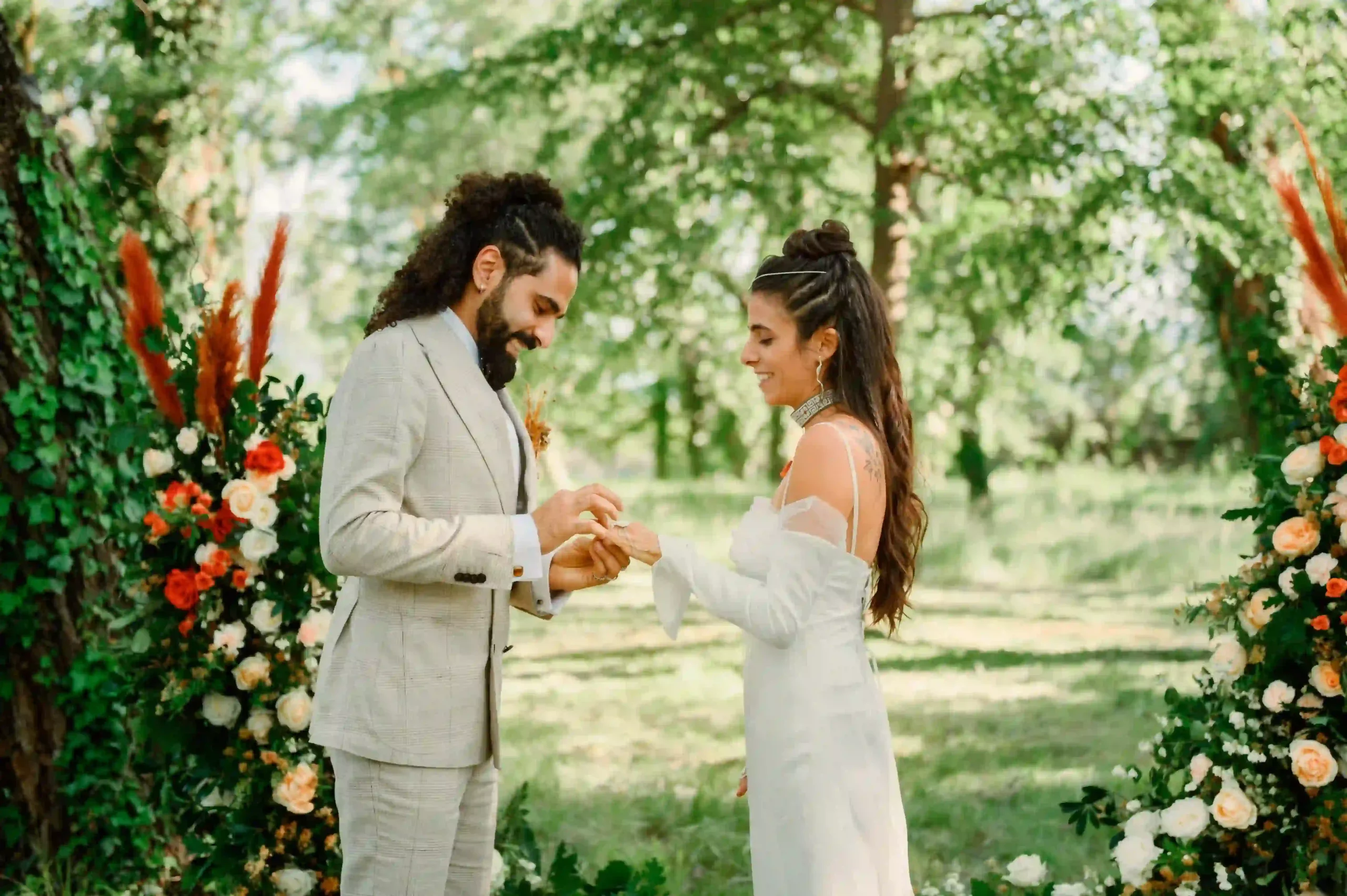
Civil Marriage
In Lebanon, only Christian or Muslim religious authorities have the legal right to perform marriages, often leaving no opportunity for mixed-faith or inter-sect couples to make their union official. However, a civil marriage made abroad is recognized in Lebanon upon return. With the marriage procedures made extremely simple – a marriage in Cyprus can be completed in a single day – the island has become a favorite spot for Lebanese couples. Marriage in Cyprus is also less costly, since the bride and the groom can save on premarital classes, required by some clerics back home, and large, costly parties that are practically seen as a must in Lebanon.
Here are the documents needed for a Lebanese couple to get married in Cyprus:
– Originals and 2 copies of international passports (valid for at least 6 months)
– Certificate of family registry (2 originals, certified by the Ministry of Justice of Lebanon)
– Certificate of family registry (1 original, certified by the Cyprus Embassy in Lebanon)
– Certificate of individual civil status (2 originals, certified by the Ministry of Justice of Lebanon)
– Certificate of individual civil status (2 originals, certified by the Cyprus Embassy in Lebanon)
– Form of intent to marry (signed by both spouses) at the Lebanese Embassy in Cyprus
After obtaining these documents, the couple should apply for a marriage license, have it translated and legalized, which takes several days. Please note that you must immediately order an additional copy of the marriage certificate to submit to the Lebanese Embassy, as well as have notarized power of attorney from both spouses addressed to the organizer for submission to the Lebanese Embassy for subsequent legalization of the marriage certificate. With Ori, you can expect full support from our wedding planners every step of the way, to make this process feel effortless and worry-free.
Katb Al-kitab
Katb al-kitab, also known as the signing of the marriage contract, is when a Muslim religious leader oversees the marriage ceremony and guides the couple through traditional vows and rituals. In Lebanese culture, it is common for a sheikh or imam to lead the ceremony, bless and pray for the couple’s future together.
Maronite Ceremony
For Maronite couples getting married in Cyprus, the most important document to obtain is the permission to get married, issued by the priest of the couples’ parish. Otherwise, the procedure for registration is very similar to a civil marriage. However, many couples choose to have their wedding ceremony in one of many beautiful Maronite churches located in Cyprus or any Catholic or Orthodox Church that is approved by the Maronite Archbishopric of Cyprus. Some of the Maronite churches of Cyprus are Ayia Kyriaki Chrysopolitissa Church, St Nicolas’ Chapel, St George’s Chapel and Minthis Hills Resort Monastery Church.
Lebanese Wedding Highlights
A Lebanese wedding is a grand event, full of vibrant colors, music and energetic dancing. It encompasses a number of cultural traditions that are observed before, during and after the wedding, such as Laylieh, Zaffe and Dabke dance, as well as more modern additions – fireworks, photoshoots and others. Here is a brief overview of everything that can make a Lebanese wedding in Cyprus feel truly special.
Venues and Decor
Good planning and organization are essential in Lebanese weddings, as these are usually huge and elaborate affairs that involve the whole family and other members of the community. The wedding ceremony may last up to three days with many ritual and traditional events woven in, a lot of music and dancing, not to mention amazing food. As such, they typically require a large venue with a spacious dining area and a dance floor. Luckily, Cyprus is well-known for its love for celebration and can offer a variety of places to suit every taste. Ori especially recommends beautiful open-air venues like Hadjiantonas Winery or Dafermou, with vineyards stretching out for miles, or comfortable hotels with splendid ballrooms, such as the Amathus, City of Dreams Mediterranean, Four Seasons, Parklane Hotel or Panorio Palace among others. Our experienced managers and wedding planners will be happy to help you choose something that appeals to you.
In an opulent event like this decor plays an equally immense role. Lebanese weddings are known for their extravagance and a “more is more” approach. In terms of decorative elements, this typically involves a heavy emphasis on florals, candles and rich fabrics with a preponderance of gold and white elements. Flowers in shades of white and pink are popular, symbolizing love and purity, crystal chandeliers and fairy lights are perfect for creating an elegant ambience, while luxurious chairs and tablecloths serve to enhance the feeling of glamor. A nice touch is adding ornate tableware and personalized cards for the guests – after all, the purpose of decor is making the experience especially enchanting for the couple and the attendees.
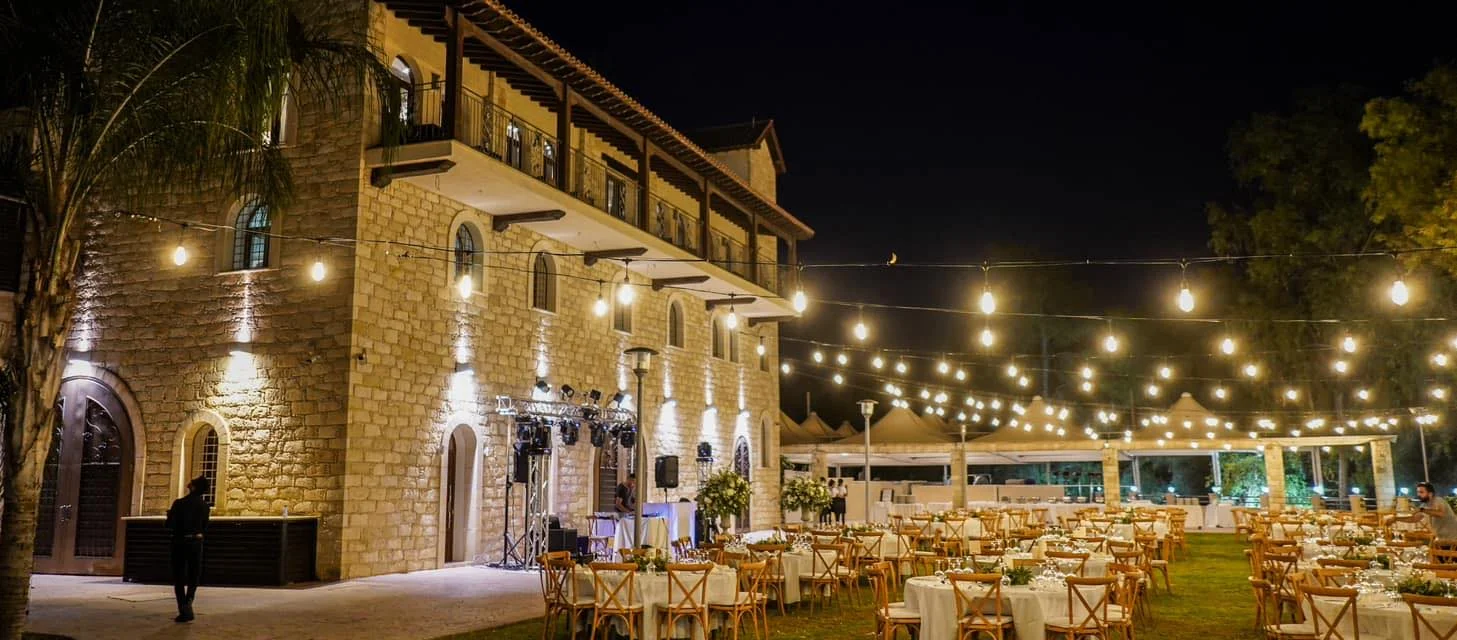
Photoshoots
Nothing goes better with a richly decorated venue than a photoshoot for the couple and their precious guests. Lebanese weddings are no exception, and Cyprus is the perfect place to create lasting memories in the form of photos or videos. Whether you prefer an outdoor location like a beach or a vineyard, or an indoor setting, our photographers and videographers will be there to assist you with crafting images of the precious moments you share during the wedding.
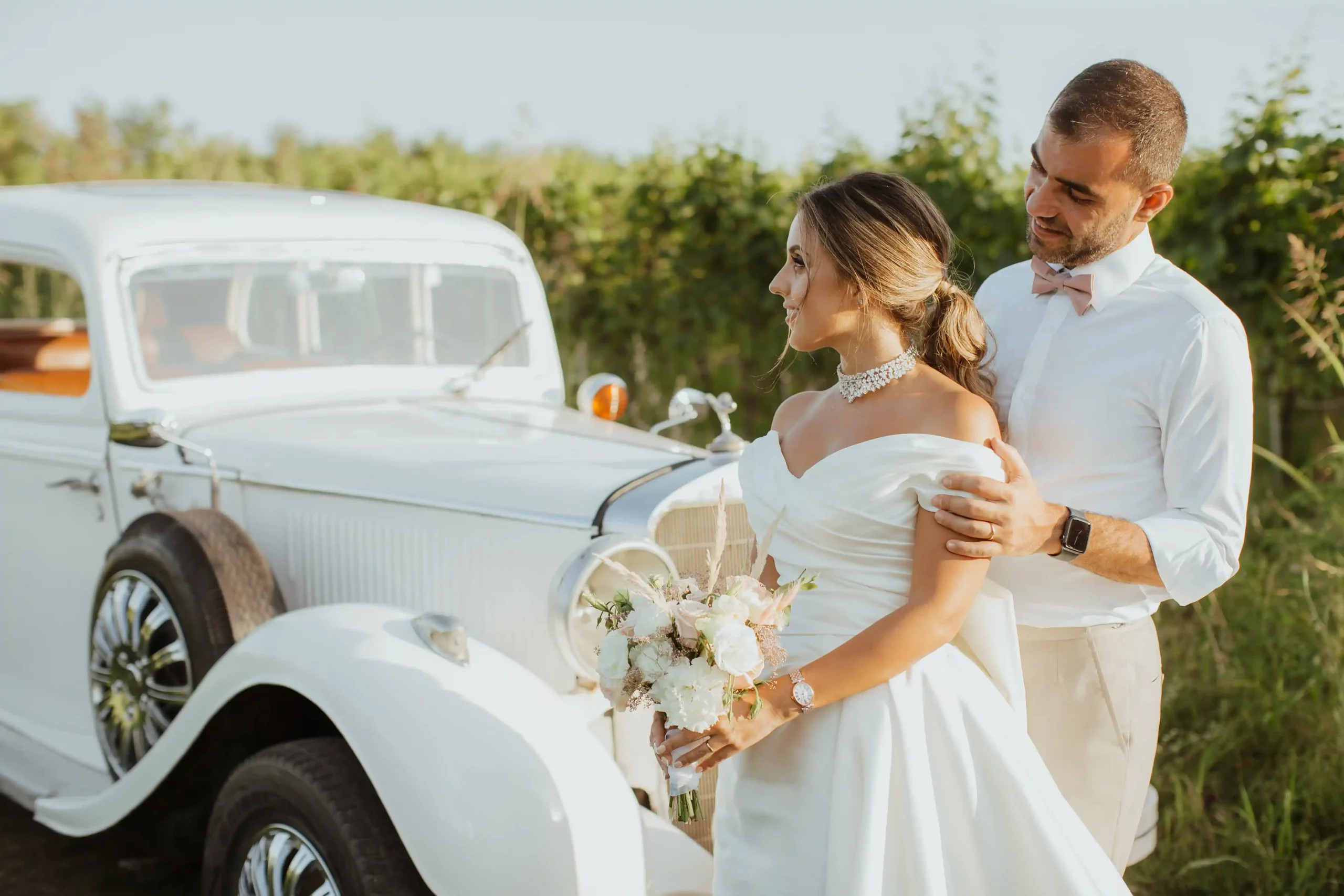
Pre-wedding Celebrations
As with many other aspects of the wedding, the support and participation of the couple’s relatives and close friends plays an important role. This significance is explained by the way a wedding is perceived – not as a union of two individuals but as a joining of two respective families, bringing a true sense of joy and belonging to anyone taking part in the celebration. So it is customary for the bride’s and the groom’s families to be included in the most prominent pre-wedding activities – the Henna Night and Laylieh.
Lebanese Laylieh
Laylieh parties are very similar in style to bachelor and bachelorette parties that commonly happen before the wedding in other cultures. Known for their extravagance, these events include lively entertainment and a lot of delectable food for the guests to thoroughly enjoy themselves.
On this day, the bride and the groom get together with their families and friends for some quality time with their nearest and dearest. As the party progresses, at some point during the night the groom and his family come to the bride’s house, bringing with them a lot of noise and merriment in a symbolic display of “stealing away the bride”. It’s a celebration of love and joy that sets the stage for the main event – the wedding itself.
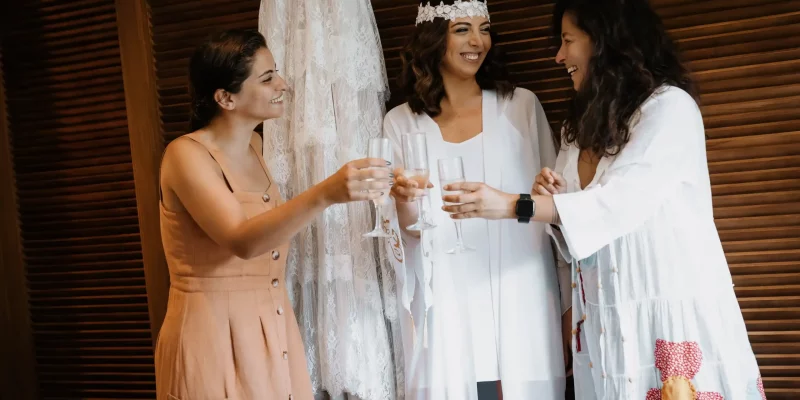
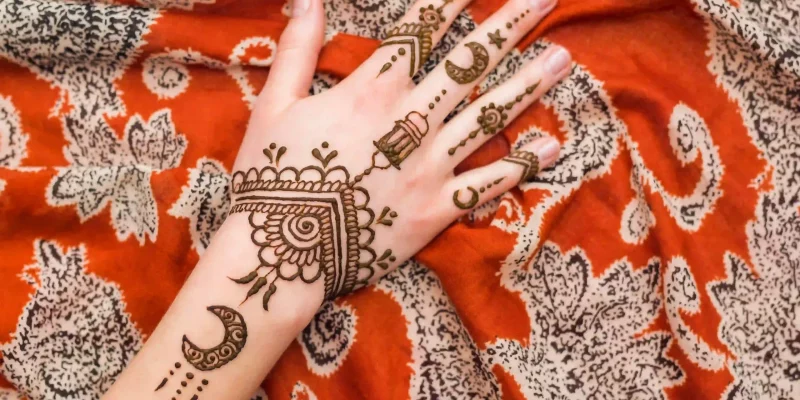
The Henna Night
Another pre-wedding event, the Henna Night takes place on the day before the wedding and holds a special significance for the bride. This is the time when the bride and her closest female friends and family come together to celebrate. Gifts and blessings are exchanged, and the bond between the bride and her cherished ones is strengthened.
The highlight of the Henna Night is the application of intricate henna designs on the bride’s hands and feet by an artist. This natural dye is not just an adornment, it has a special significance, symbolizing good luck and fertility. This pre-wedding ritual is a vibrant and spirited affair, full of music and laughter, that adds extra excitement and anticipation to the entire ceremony.
The Reception
A traditional Lebanese wedding reception is unlike any other. Rich in events and rituals, it is as colorful and opulent as an ancient tapestry. Here are some of the main parts that make it an unforgettable occasion that can take one’s breath away.
Zaffe
Also known as “the grand entrance”, this is an incredibly fun and energetic lead-in to the main party. The couple’s arrival at the celebration turns into a magnificent ceremony, accompanied by drummers, professional Zaffe dancers and musicians. They then proceed to dance at the venue, with the guests clapping and joining in. The combination of rhythmic beats, characteristic of traditional Lebanese music, enthusiastic participants, and bright raiments make it impossible not to be carried away by this flamboyant celebration of love that has become an iconic mark of Lebanese culture.
Dabke
This vibrant line and circle dance is what usually follows Zaffe. Performed by a group of skilled folk dancers and singers, it has the guests of all ages join hands and follow the steps of a leader in a mesmerizing display of unity, joy and cultural pride. When the Dabke music starts playing, people can’t help but be drawn to the dance floor, so it might be some time before everyone is seated down to enjoy the meal.
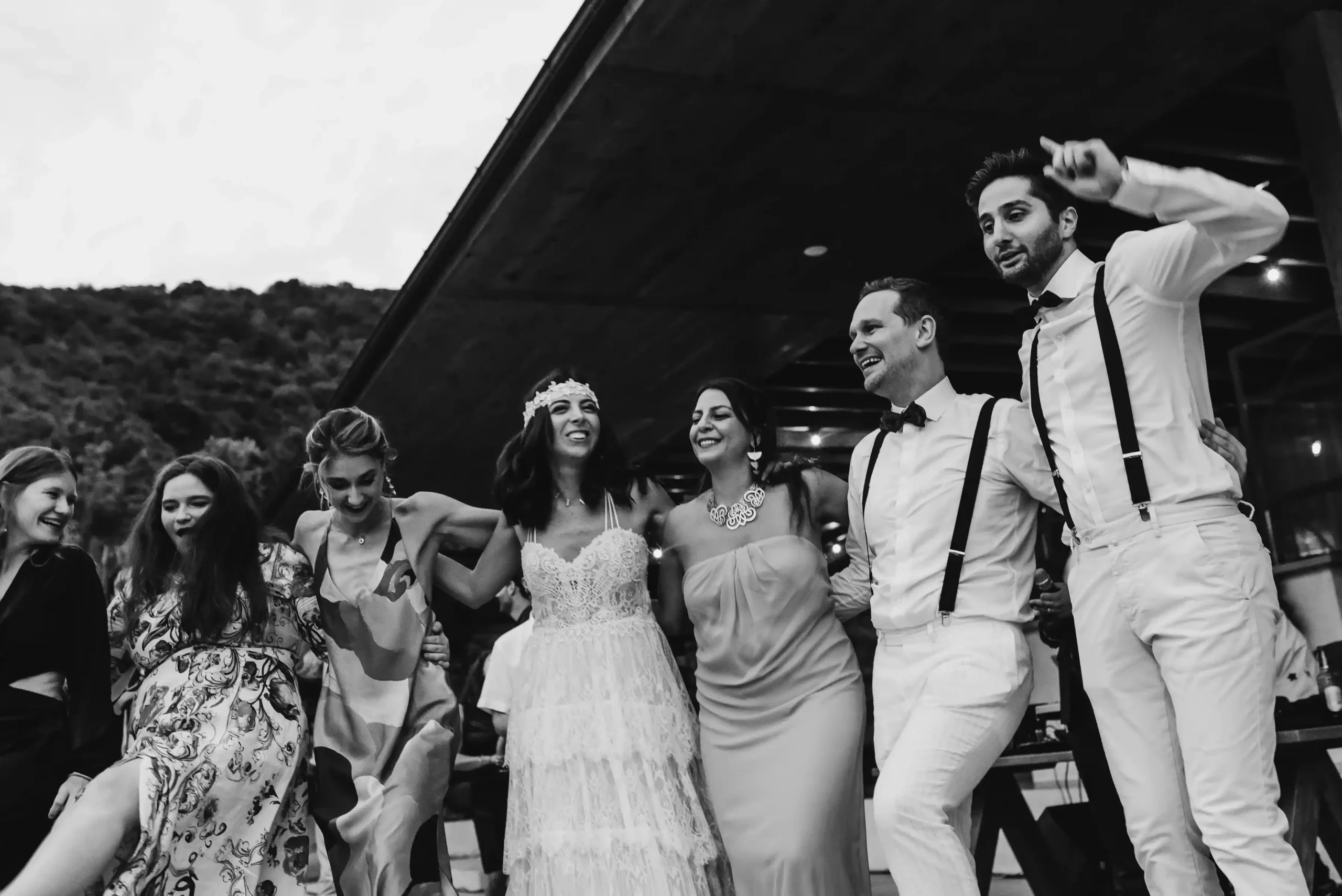
Live Music And Entertainment
There is no Lebanese wedding without lively dancing and electrifying music. In this respect, Cyprus is an impressively suitable choice, seeing as its culture boasts a deeply ingrained sense of music and dance appreciation – a great number of venues are ready to offer couples a spacious area for celebration or a well-designed and equipped dancefloor. Live musicians, skilled in the use of traditional instruments like ouds (a pear-shaped stringed instrument) or tablah (a drum), can easily be invited, as well as Lebanese wedding bands or groups of belly dancers, whose enchanting and colorful performance is said to give blessings to the newlyweds and encourage a fruitful, harmonious life together.
Fine dining
Good food is one of the most important aspects of hospitality – something Cyprus is rightly famous for. This is especially relevant, when picking a spot for a Lebanese wedding, since fine dining plays a key role in this celebration, since it’s all about sharing food and precious moments with family and friends. The wedding platter, known as “Siniyye” embodies this shared harmony and offers a beautiful arrangement of treats to delight the guests and often includes various items, such as almonds, dried fruits, and traditional sweets. Mezze is another popular way of serving dishes to your guests, which is also widespread in Cypriot restaurants and other venues. And of course, you can always opt for a classic three-course meal to add a bit of timeless charm to your celebration.
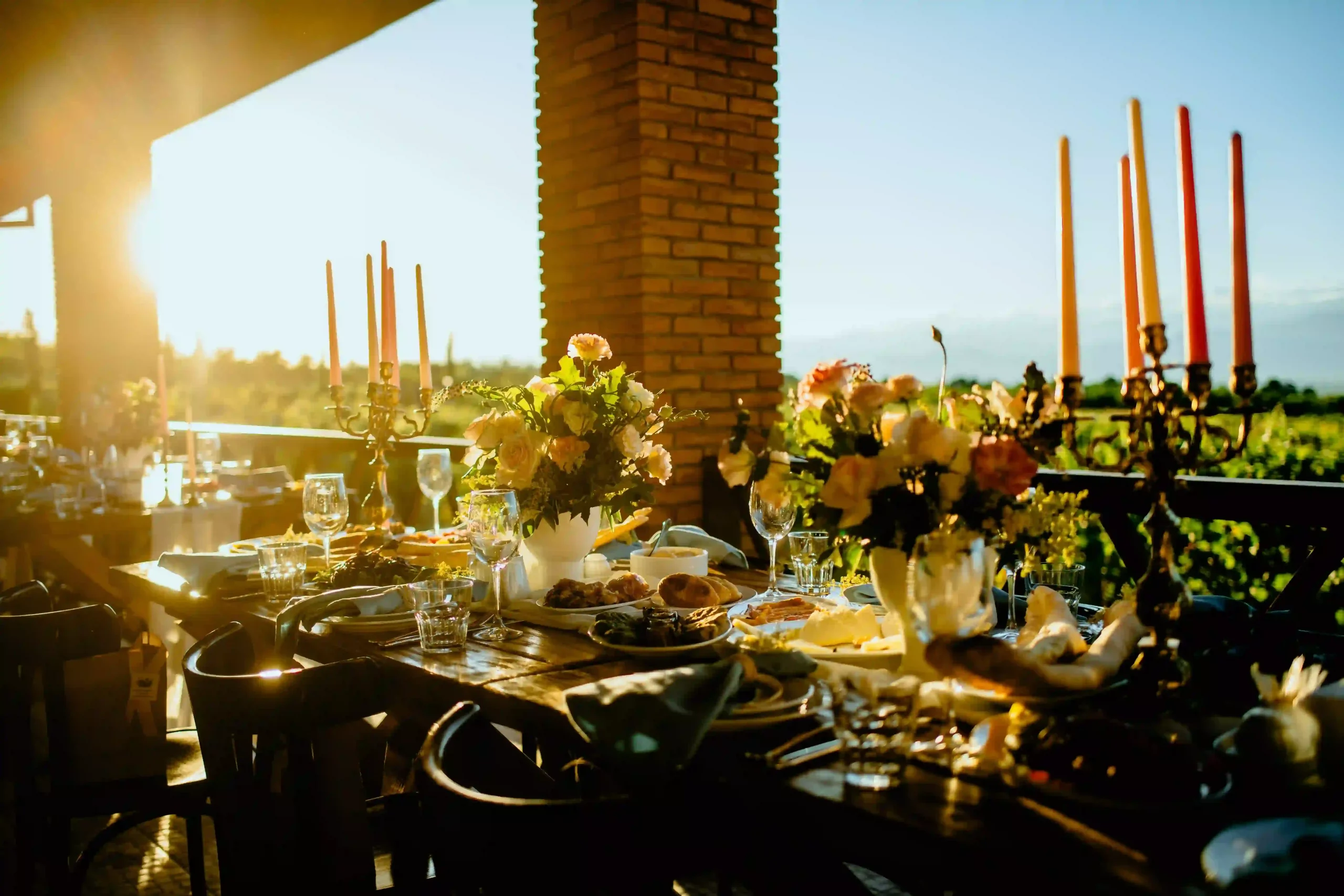
Wedding Cake
No matter if it is a more formal celebration or an intimate ceremony, a wedding cake is another integral part of a Lebanese wedding. These cakes are a notable part of the culture, and are viewed as a symbol of fertility, so no effort is spared in making them look and taste fantastic. There is a clear preference among Lebanese couples for multi-tiered, beautifully decorated cakes with live flowers or the couple’s initials among the adornments. A beloved tradition often has the newlyweds cut the cake with a ceremonial sword, symbolizing a very sweet future together. The roots of this tradition can be traced back to ancient times when it was customary for men to wear swords and use them to cut food and serve it to their guests as a sign of honor and hospitality. Now the sword represents the groom’s strength and desire to protect his bride in their future married life.
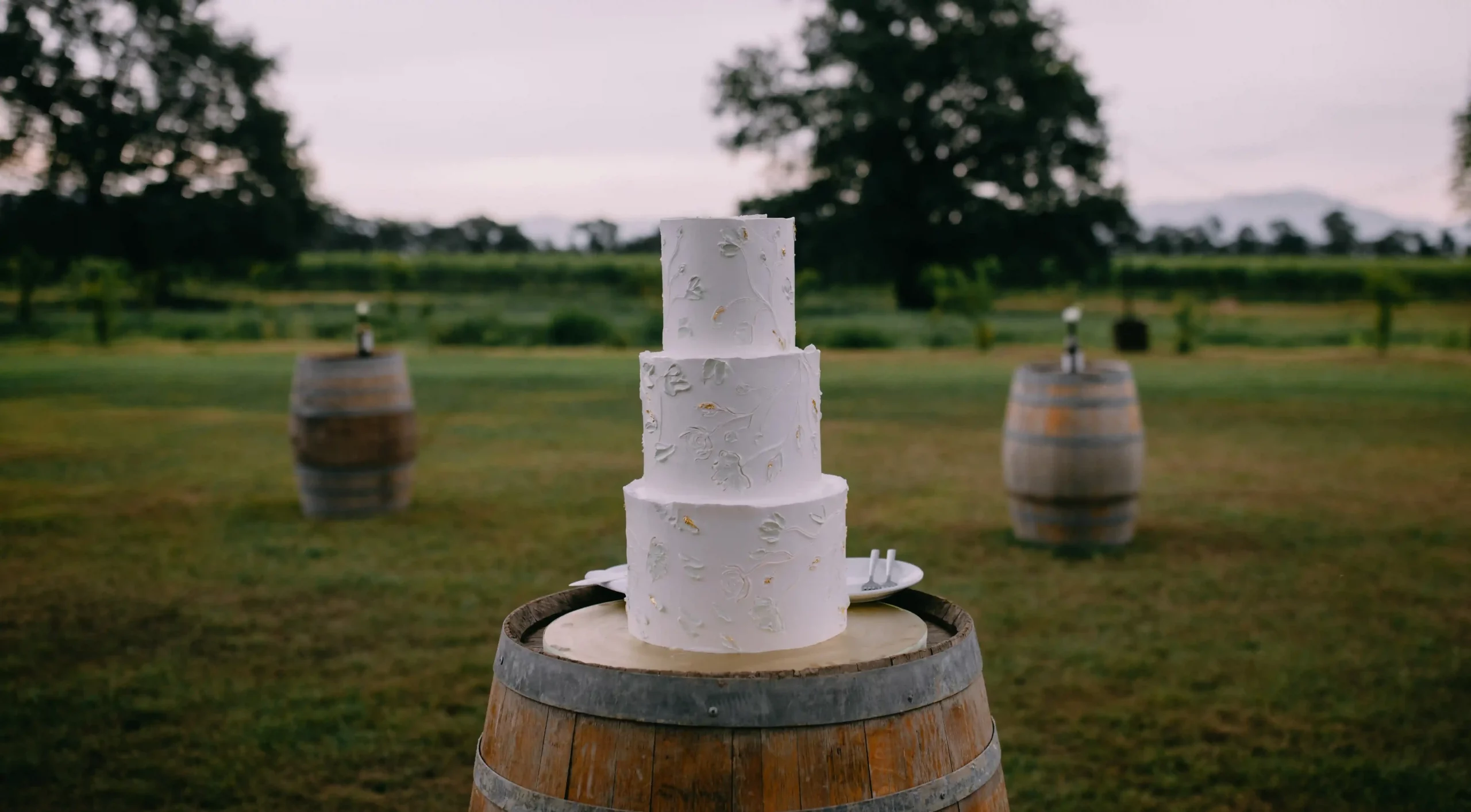
Post-wedding Traditions
A Lebanese wedding doesn’t stop when the party does. After the wedding reception it’s time for the after-party that includes several popular traditions and activities, and is often as lavish as the main event.
The Shower
One of the most beloved traditions for the after-parties is called a “shower”, where the guests shower the newlyweds with flower petals or confetti, and sometimes even money, wishing them prosperity and unity in their married life. Dancing and feasting would then continue well into the night.
Fireworks
A magnificent firework display is practically a must at a Lebanese wedding, and not just because it’s a fantastic conclusion to any party. These vivid bursts of light are a symbol of the exuberance and jubilation that surrounds the couple and their bright future together. Imagine the beautiful Cyprus night sky lighting up with a multitude of fiery flowers to celebrate your union – this is an awe-inspiring experience that will remain with you for years to come.
The Bride and the Groom
In Lebanese culture, it is seen as rude for the newlyweds to leave before all of their guests do, so they’ll have to remain at the reception until every attendee is gone. Surprisingly, this tradition is shared by Cypriot weddings, so we know just how important it is to organize every aspect of the celebration to your liking, however long it lasts.
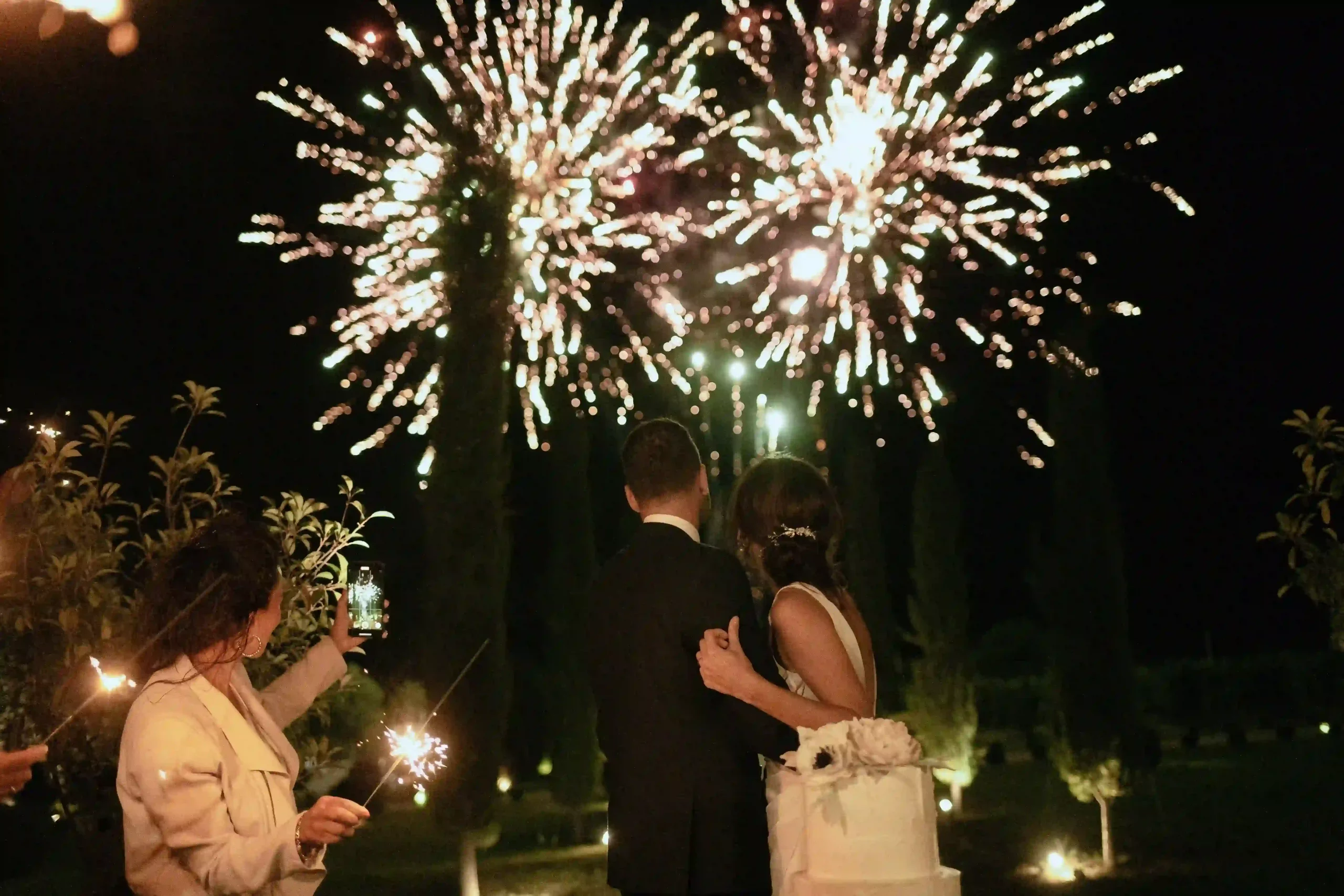
Conclusion
While Lebanese weddings are known for their extravagance and deeply rooted traditions, not every couple may choose to follow all of them. Some could prefer not to have a Zaffe or a Dabke dance in favor of a more modern wedding reception, others might decide on a purely civil marriage ceremony, instead of a religious one. Our professionals at Ori are aware of this demand for flexibility and will be more than happy to help you plan the wedding of your dreams in Cyprus, whatever it may be, down to the smallest details.
Start planning the wedding of your dreams today!
Leave your inquiry and receive a detailed estimate within 1 day
Related Articles
Find more inspiring articles about breathtaking weddings in Georgia and Cyprus on our blog


